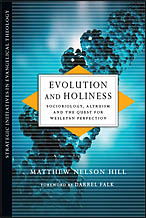"Evolution and Holiness" by Matthew Nelson Hill. A Review
Evolution and Holiness: Sociobiology,
Altruism and the Quest for Wesleyan Perfection
Matthew Nelson Hill
IVP Academic (InterVarsity Press)
PO Box 1400
Downers Grove, IL 60515
ISBN: 978-0-8308-3907-0; $30.00; February
2016
Reviewed by Rev. Dr. Michael Philliber for
Deus Misereatur
Intriguing. 3 Stars out
of 5
There you are at a
huge family reunion and everyone is related in some way. Many have the same family
name, though there’s a mixture of other names through marriage, along with a
plethora of body shapes, sizes, colors and regional dialects. Each group slowly
huddles around folks they’re familiar with, and the reunion becomes a band of
clans, all related but different. As you take the bold step to meander between clusters,
you happen on one knot of people and come to the awkward realization that
though this particular crowd is linked to the larger family, their assumptions
and approaches to politics and religion are clearly different and outside of
your purview. Something like this happened as I picked up and began reading “Evolution and Holiness: Sociobiology,
Altruism and the Quest for Wesleyan Perfection” by Matthew Nelson Hill, assistant
professor of philosophy in the department of theology at Spring Arbor
University and ordained elder in the Free Methodist Church. Instead of the
subjects covering politics and religion, they were about evolution and Wesleyan
holiness, both of which were beyond my normal horizon. It’s a book that has the
feel of a doctoral thesis, but is readable by most.
“Evolution and
Holiness” covers both of these subjects, with the first four chapters on
evolution, and the final three on Wesleyan holiness. It is immediately clear
that the author is writing from within the context of Darwinian evolution. As
Darrel R. Falk, professor of biology and dean of graduate students at Point
Loma Nazarene University in Point Loma, California, states things in the
forward, “Biologists have demonstrated with near certainty that humans were
created through the evolutionary process” (9). Therefore, the author himself affirms, “In my
view, God and evolution are not antithetical. There is no reason that God could
not have used the process of evolution to create free will, or even morality in
his creation...” (107, fn 2). From
within this framework Hill does two
things. First, he challenges the assumptions and inconsistencies of certain
sociobiologists, like Richard Dawkins and E.O. Wilson, repeatedly emphasizing
that humans “are not slaves to their genes, they are free to overcome and
ignore them” (131). Next, the author builds a case for the moral-forming dance
between evolution, genetic proclivities, environmental factors and community
for humankind; “It is precisely this concoction of genes and environment that
creates the freedom of human nature to transcend the biological and cultural” (104).
After having favorably interacted with
evolutionary biology, and setting the stage that humankind can rise above the
tyranny of their genes (127), the author next draws the reader into the interaction
of John Wesley’s program of holiness and “perfecting perfection” (143) and
evolution. Hill informatively and knowledgably explicates Wesley’s perspective
on original sin, holiness, and theosis.
He spends considerable time and ink exhibiting how, “through a combination of
human choice and the grace of God, humans possess the ability to continually “overcome”
their genes and achieve Christian perfection in this life” (161-2); that even
though genetic urges toward selfishness do not go away, a person “has the grace
to overcome the genetic urges and achieve Christian perfection, as well as the
grace to continue in the process of overcoming the genetic urges after
perfection” (Ibid.). To move beyond genetic
proclivities of selfishness requires not only the grace of God, but also the
aid of others, where there is a marriage between “a personal encounter with
Christ and a shared experience within a close Christian community” (193). Here
the author explains and shows the importance of Wesley’s communal structure of
classes, bands and select societies, where there is not only a strident
accountability structure, but also an active approach to altruism.
Evolution and Wesleyan holiness are not on my
normal horizon, and I would seriously dispute the author on both counts, most especially
as I found the author’s evolutionary assumptions troublesome. To embrace the
position, seems to me, undermines not only sacred Scripture but also the active
role of God in creation, the created order and the creature. The material regularly
left me cold and perplexed, especially with statements such as, “At what point
morality actually burgeoned from social life is impossible to determine, and
there is no comprehensive convincing argument that completely “explains” the
origin of morality” (98). Most astute Christian readers will immediately catch
why this statement, and others like it, is extremely awkward and alarming.
Nevertheless “Evolution and Holiness” was an
informative work. I appreciated the historical background on Wesley, his
program and rationale. And I was quite pleased with the author’s emphatic
reminder that we are not the sum total of our genetic make-up and biological tendencies,
but that by the grace of God a person has the ability to act in spite of those influences. With my
concerns and disagreements voiced, I think the book is worthwhile, especially
for those interested in Wesley’s holiness program.
Thanks to IVP
Academic for providing, upon my request, the free copy of “Evolution and
Holiness” used for this review. The assessments are mine given without
restrictions or requirements (as per Federal Trade Commission’s 16 CFR, Part
255).
Feel free to re-post or re-publish this review; just please give credit where credit is due Mike




Comments